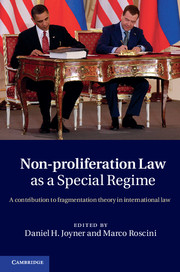21 results
Why I Stopped Believing in Customary International Law
-
- Journal:
- Asian Journal of International Law / Volume 9 / Issue 1 / January 2019
- Published online by Cambridge University Press:
- 31 October 2018, pp. 31-45
- Print publication:
- January 2019
-
- Article
-
- You have access
- HTML
- Export citation
16 - The legal meaning and implications of Article VI of the Non-Proliferation Treaty
- from Part V - International disarmament law
-
-
- Book:
- Nuclear Weapons under International Law
- Published online:
- 05 September 2014
- Print publication:
- 28 August 2014, pp 397-417
-
- Chapter
- Export citation
Contributors
-
-
- Book:
- Nuclear Weapons under International Law
- Published online:
- 05 September 2014
- Print publication:
- 28 August 2014, pp viii-xiii
-
- Chapter
- Export citation
Abbreviations
-
- Book:
- Non-Proliferation Law as a Special Regime
- Published online:
- 05 October 2012
- Print publication:
- 20 September 2012, pp viii-x
-
- Chapter
- Export citation
5 - Withdrawal from non-proliferation treaties
- from I - The law of treaties
-
-
- Book:
- Non-Proliferation Law as a Special Regime
- Published online:
- 05 October 2012
- Print publication:
- 20 September 2012, pp 151-172
-
- Chapter
- Export citation
Non-proliferation Law as a Special Regime - Half title page
-
- Book:
- Non-Proliferation Law as a Special Regime
- Published online:
- 05 October 2012
- Print publication:
- 20 September 2012, pp i-ii
-
- Chapter
- Export citation
Index
-
- Book:
- Non-Proliferation Law as a Special Regime
- Published online:
- 05 October 2012
- Print publication:
- 20 September 2012, pp 278-291
-
- Chapter
- Export citation
I - The law of treaties
-
- Book:
- Non-Proliferation Law as a Special Regime
- Published online:
- 05 October 2012
- Print publication:
- 20 September 2012, pp 15-172
-
- Chapter
- Export citation
Non-proliferation Law as a Special Regime - Title page
-
-
- Book:
- Non-Proliferation Law as a Special Regime
- Published online:
- 05 October 2012
- Print publication:
- 20 September 2012, pp iii-iii
-
- Chapter
- Export citation
Contents
-
- Book:
- Non-Proliferation Law as a Special Regime
- Published online:
- 05 October 2012
- Print publication:
- 20 September 2012, pp v-vi
-
- Chapter
- Export citation

Non-Proliferation Law as a Special Regime
- A Contribution to Fragmentation Theory in International Law
-
- Published online:
- 05 October 2012
- Print publication:
- 20 September 2012
Introduction
-
-
- Book:
- Non-Proliferation Law as a Special Regime
- Published online:
- 05 October 2012
- Print publication:
- 20 September 2012, pp 1-14
-
- Chapter
- Export citation
Contributors
-
-
- Book:
- Non-Proliferation Law as a Special Regime
- Published online:
- 05 October 2012
- Print publication:
- 20 September 2012, pp vii-vii
-
- Chapter
- Export citation
Conclusions
- from II - The law of state responsibility
-
-
- Book:
- Non-Proliferation Law as a Special Regime
- Published online:
- 05 October 2012
- Print publication:
- 20 September 2012, pp 270-277
-
- Chapter
- Export citation
II - The law of state responsibility
-
- Book:
- Non-Proliferation Law as a Special Regime
- Published online:
- 05 October 2012
- Print publication:
- 20 September 2012, pp 173-277
-
- Chapter
- Export citation
Copyright page
-
- Book:
- Non-Proliferation Law as a Special Regime
- Published online:
- 05 October 2012
- Print publication:
- 20 September 2012, pp iv-iv
-
- Chapter
- Export citation
The 2010 Strategic Arms Reduction Treaty
-
- Journal:
- International Legal Materials / Volume 50 / Issue 3 / June 2011
- Published online by Cambridge University Press:
- 27 February 2017, pp. 340-356
- Print publication:
- June 2011
-
- Article
- Export citation
I. RECENT DEVELOPMENTS IN INTERNATIONAL LAW REGARDING NUCLEAR WEAPONS
-
- Journal:
- International & Comparative Law Quarterly / Volume 60 / Issue 1 / January 2011
- Published online by Cambridge University Press:
- 27 January 2011, pp. 209-224
- Print publication:
- January 2011
-
- Article
- Export citation
Death by Moderation: The U.S. Military's Quest for Useable Weapons. By David A. Koplow. Cambridge, New york: Cambridge University Press, 2010. Pp. xx, 263. Index. $85, £55, cloth; $28.99, £17.99, paper.
-
- Journal:
- American Journal of International Law / Volume 104 / Issue 4 / October 2010
- Published online by Cambridge University Press:
- 27 February 2017, pp. 711-713
- Print publication:
- October 2010
-
- Article
- Export citation
The United Nations Security Council Resolution 1874
-
- Journal:
- International Legal Materials / Volume 48 / Issue 5 / October 2009
- Published online by Cambridge University Press:
- 27 February 2017, pp. 1174-1179
- Print publication:
- October 2009
-
- Article
- Export citation



